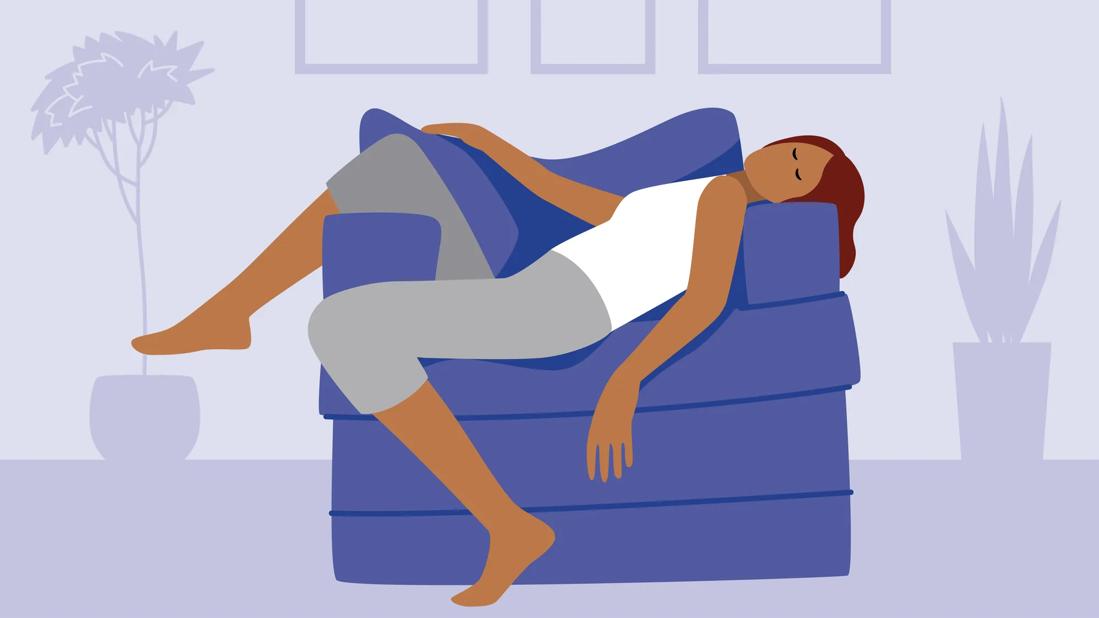Fatigue is a result of hormones and the physical toll of pregnancy — eat well, stay hydrated and sleep when you can

Sure, you’ve been tired before. You’ve pulled the occasional all-nighter studying for finals. You’ve stayed out too late when you were having too much fun.
Advertisement
Cleveland Clinic is a non-profit academic medical center. Advertising on our site helps support our mission. We do not endorse non-Cleveland Clinic products or services. Policy
But pregnancy fatigue? That can hit differently.
It’s a kind of tired you can feel deep in your bones. That an afternoon nap doesn’t even scratch the surface of. That makes you yearn for an extra cup of coffee, even when you know you’re supposed to be keeping your caffeine intake low.
But you’re not alone. Feeling fatigued, or even flat-out exhausted, during pregnancy isn’t uncommon. In fact, it’s among the most frequent complaints.
We talked with Ob/Gyn Alison Stalzer, DO, about why pregnancy makes you so tired. And what to do about fatigue during pregnancy.
Early in pregnancy, your body is working hard to set up shop to sustain healthy fetal development. And frankly, that takes a lot of energy.
First, there are the hormonal shifts that set the stage for sleepiness. Ramped-up levels of progesterone in particular can leave you exhausted.
What’s more is that during pregnancy, your blood volume increases, causing your heart to work harder with each beat. And even though you don’t notice it, it takes a lot of work to keep up.
And the mental and emotional load of being pregnant can be tiring, too. All the planning. The decisions to make. The prenatal appointments to juggle. The worry. The excitement. The financial questions. It can take up a lot of space in your brain. And leave you feeling tapped out.
Advertisement
Later on, your energy can be zapped by the physical toll of pregnancy. The aches. The discomforts. The middle-of-the-night trips to the bathroom.
It all adds up. And can leave you feeling like you’re running on fumes.
Pregnancy fatigue is usually at its height around the middle of your first trimester. That’s around weeks six to eight. But, of course, some may find that their energy runs low sooner or later than that.
“Typically, we see that fatigue is worst in the first trimester,” Dr. Stalzer confirms. “Then, in the second trimester, you tend to get a little bit of burst of energy. In the third trimester, you may go back to feeling tired all over again.”
The reason for that?
Blame hormones for first-trimester fatigue. But as you’re in the homestretch of pregnancy, sleepiness is less about your body chemistry and more about the toll of lugging around a big bump all day — and the impact that has on your nights.
“In the third trimester, fatigue is more often related to the fact that it can be hard to sleep and you’re generally uncomfortable,” she adds.
Knowing that it’s normal to feel tired during pregnancy might be of little comfort when your entire body is protesting getting out of bed each morning. Not to mention staying awake throughout the day.
We get it.
And while it may seem like more sleep is the only way out of this fog (and it will certainly help!), there are some other ways to help get a bit more pep in your step.
Here’s what to try:
Advertisement
Yes, tiredness comes with the business of pregnancy. But extreme fatigue that lasts into the second trimester may also be a sign of an underlying health condition.
During your prenatal appointments, your Ob/Gyn or midwife should screen you for thyroid disease, which can complicate pregnancy and leave you extra sleepy.
Sleep apnea may also be a concern. That’s true especially if you were diagnosed or were at risk for sleep apnea before pregnancy.
Bottom line? If fatigue is affecting your day-to-day, talk with your healthcare provider to rule out an underlying health condition. And they may suggest pregnancy-safe medications to help you get the rest your body needs.
Advertisement

Sign up for our Health Essentials emails for expert guidance on nutrition, fitness, sleep, skin care and more.
Learn more about our editorial process.
Advertisement

Most rashes aren’t dangerous — but it’s worth talking to your pregnancy provider about them

The best available evidence indicates that, used correctly, acetaminophen is safe to take throughout a pregnancy

Prenatal massage, done properly, is a safe and effective way to lower stress and relieve pregnancy discomforts

Avoid high-mercury fish and processed meat, and go easy on salt and caffeine

Unless your healthcare provider tells you otherwise, it’s typically considered safe to have sex during pregnancy

Hot tubs and saunas raise your body temperature and can pose risks

Baths can be safe if you turn down the temp, avoid irritating bath products and take extra precautions against

SSRIs are the safest antidepressants to take in pregnancy — and pose less risk than unmanaged depression

Although it could be used as a moisturizer, this new trend is not recommended

Communicating clear limits helps protect your time, energy and emotional well-being

High cholesterol can be genetic, but testing and treatment can lower your heart disease risk